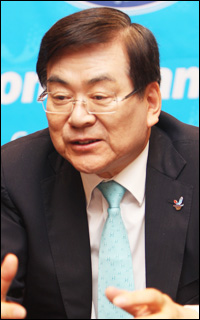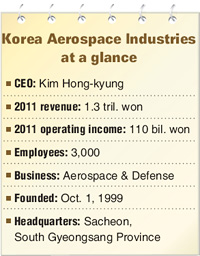
Cho Yang-ho’s dream

Can Hanjin chairman acquire KAI this time?
Hanjin Group Chairman Cho Yang-ho is seeking to transform Korean Air, the conglomerate’s flagship unit and the country’s largest carrier, into a leading international aerospace company by acquiring Korea Aerospace Industries (KAI). He also hopes to expand its hotel business to create synergy with the airline and other group units.
His vision seems one step closer to realization. The Korea Finance Corp. (KoFC) is about to dispose of KAI, while rules making it difficult for Hanjin to build a luxury hotel in downturn Seoul will soon be relaxed.
The state policy lender said Thursday that Korean Air and Hyundai Heavy Industries submitted a bid to acquire a 42 percent stake, or 40.7 million shares, in KAI, after closing a second round of bidding at 3 p.m.
KAI dominates the local market for designing and producing aerospace vehicles and machinery. Among others, KAI makes the T-50 Golden Eagle supersonic trainer jet and the Surion utility helicopter.
It had initially been expected that the bidding process would be nullified for a second time because only Korean Air took part in the process.
By law, at least two parties must participate in an open bid for entities owned by the government or state-funded organizations. If just one party takes part in the bidding, it will be deemed void. Then, creditors are allowed to relinquish the stake by means of a private contract.
Its first attempt foundered on Aug. 31 because the airline was the only one to express official interest.
“Korean Air and Hyundai Heavy Industries submitted a bid. With the two entities participating in the sales process, it has been validated,’’ said a KoFC official familiar with the matter. “We will meet with other creditors to select the preferred bidder next week.’’
Contrary to market expectations, Korean Air welcomed Hyundai Heavy’s participation as the two-way competition put the sales process back on track.
“We are glad that the second bidding was not nullified. Either through an open competition or a private contract, we will do everything we can to acquire the aerospace firm,’’ a Korean Air executive said. “Hyundai Heavy’s presence will also help free us from groundless accusations that we may be favored by the KoFC.’’
It will quell any speculation surrounding the purchase. The KoFC has feared a potential backlash from political parties and civic groups if Korean Air buys KAI through a private contact.
The policy lender was concerned that it could be accused of providing undue favors to a certain business, ahead of the presidential election if the country’s largest carrier acquires KAI without any competition.
The KoFC has a 26.4-percent stake, with the remaining 15.6 percent held by stakeholders including Samsung Techwin, Hyundai Motor and Doosan.
According to market analysts, the stake sale could generate as much as 1.4 trillion won for creditors.
They say KAI shares have been hovering at around 26,000 won and whoever takes over the aerospace firm may have to pay about 300 billion won more for a management premium.
The official added that both firms will conduct due diligence on KAI in October. “We will then carry out the final bidding and sign a securities purchase agreement (SPA) with the winner by the end of the year.’’
Building luxury hotel in downtown Seoul
Hanjin has also been seeking to construct a seven-star hotel in downtown Seoul near Gyeongbok Palace This project has been pushed by Heather Cho, senior vice president of Korean Air the eldest daughter of the group chairman.
The conglomerate bought a 36,642 square-meter plot in Songhyun-dong, Jongno, from Samsung Life Insurance in 2008 for 290 billion won.
But it has not been able to develop it because Seoul City opposed the proposal, citing a law banning the construction of a hotel and other entertainment establishments within 200 meters of schools. There are currently three middle and high schools in the proximity of the site.
However, the government recently announced a plan to ease the rule, allowing hotels and other tourism-related facilities to be set up near schools if they do not operate casinos, bars and other entertainment-related businesses.
“We welcome the government’s recent move to relax the regulations preventing us from building a hotel on our land. But the project still has a long way to go as the National Assembly first needs to approve the revision,’’ the executive said. “Even after that, we still need to consult with Seoul City and receive approval from it.’’ <The Korea Times/Lee Hyo-sik>



